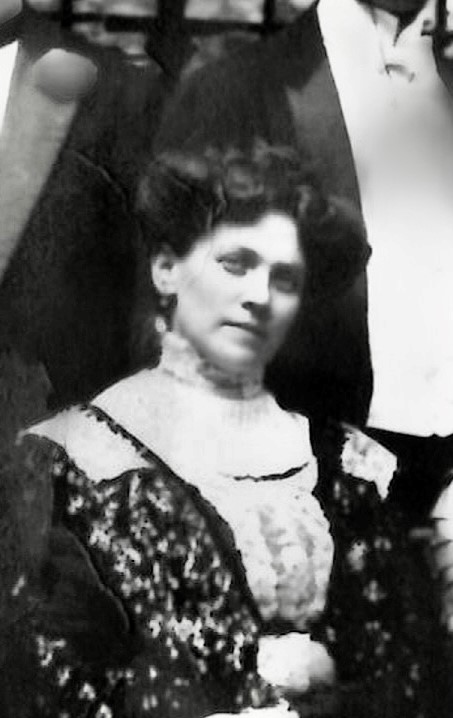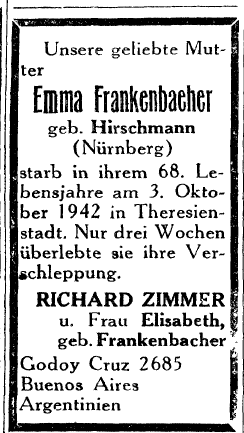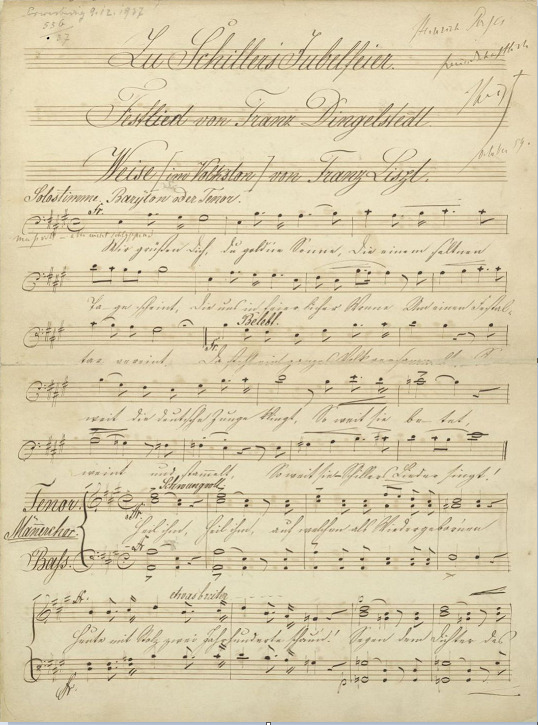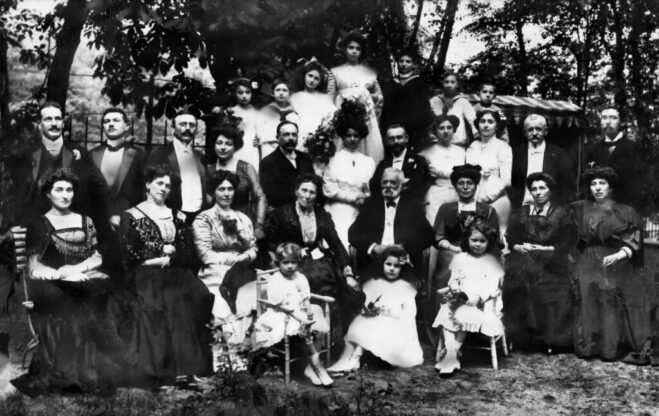The Hirschmann/Frankenbacher family around 1910 (Emma Frankenbacher 2nd position from the left, Elisabeth Frankenbacher in front, 3rd position from the left) © private
“She only survived three weeks after her deportation”
by Cora Chall and Rüdiger Haufe
Emma Frankenbacher from Nuremberg died in 1942 in the Theresienstadt concentration camp. The Klassik Stiftung Weimar now restituted two handwritten musical scores by Liszt to her heirs.
>> read German translation here
The persecution of Jewish citizens in Germany began immediately after the National Socialist rise to power in January 1933. The so-called Nuremberg race laws passed in September 1935 massively increased the pressure. Many persecuted citizens were forced to sell their belongings in order to ensure their survival, to pay compulsory levies or to finance their emigration. In many cases, they were unable to achieve acceptable market prices. In such a situation, Emma Frankenbacher from Nuremberg offered two musical scores for sale to the Weimar Liszt Museum in October 1937.
Emma Frankenbacher, née Hirschmann, came from a Jewish family. She was born in 1875 in Ansbach in the Franconian region of Germany. From 1899, she was married to Jakob Frankenbacher. He was also of Jewish descent. The couple lived in Nuremberg since 1903. In the same year, their daughter Elisabeth was born there.
Jakob Frankenbacher died in 1936. Elisabeth and her husband Richard Zimmer emigrated in August 1937 to Argentina. At the time of the offer to the Liszt Museum, Emma Frankenbacher was widowed and lived in enforced separation from her only child in Nuremberg.

Emma Frankenbacher, circa 1910. © private
No personal written records from Emma Frankenbacher have survived from the period of persecution – with the exception of a letter she wrote in April 1941 to her daughter and son-in-law in Argentina. She still expressed the hope of escaping abroad to safety. She wanted to join her daughter in South America. In addition, she had applied for an entry visa to the United States. With reference to these plans, she closed her letter with the words: “Farewell for today, I would love to have mail from you with good news soon.”
Her hopes were not fulfilled
Emma Frankenbacher did not manage to leave Germany anymore. From October 1941, the Nazi regime issued a general ban of travel abroad for all Jewish Germans. Soon afterwards, deportations to the extermination camps began. Emma Frankenbacher was deported to the Theresienstadt concentration camp on 10 September 1942. She died there on 3 October 1942, aged 67.
Elisabeth Zimmer found out about her mother’s fate only after the end of the Second World War. Together with her husband, she placed a death notice in the German-Jewish newspaper “Aufbau,” published in New York. It contains a statement that gives a sense of the unspeakable conditions under which human beings like Emma Frankenbacher lived and died in Theresienstadt: “She only survived three weeks after her deportation.”

Death notice for Emma Frankenbacher in the newspaper “Aufbau,” 2 November 1945
One of the handwritten musical scores which Emma Frankenbacher sold to Weimar in 1937 was a copy of Franz Liszt’s (1811–1886) Piano Concerto No. 1 in E-flat major, comprehensively reworked by the composer, which was the final version used as a so-called engraver’s copy for the first printed edition of 1857.
The second manuscript was a copy of the score for the “Festlied zu Schillers Jubelfeier” written on the occasion of the centenary of Friedrich Schiller’s birth. It includes an autograph dedication by the composer to Heinrich Porges (1837−1900). The musician and music critic Porges was an enthusiastic follower of Franz Liszt and an intimate of Richard Wagner.
The purchase negotiations in 1937 were handled by the Goethe National Museum, which was the overarching administrative entity for the Liszt Museum. According to Emma Frankenbacher, the former owner of the manuscripts had been the conductor and composer Max Erdmannsdörfer (1848–1905), who had been in contact with both Liszt and Porges. Emma Frankenbacher received a total of 150 Reichsmark for her two musical scores. The two sheets first entered the Liszt Museum. Later they were transferred to the Liszt Collection of the Goethe- und Schiller-Archiv.

Musical score “Zu Schillers Jubelfeier” with autograph dedication by Franz Liszt, 1859. © Klassik Stiftung Weimar
The Goethe National Museum, the Liszt House, and the Goethe- und Schiller-Archiv are today part of the Klassik Stiftung Weimar. Since 2010, the Klassik Stiftung Weimar has been undertaking a systematic review of its holdings, both chronological and comprehensive, to identify cultural property seized as a result of National Socialist persecution.
The provenance of the musical scores by Liszt have also been investigated in detail. The sale in 1937 was considered a result of Nazi persecution and as a transaction disadvantaging Emma Frankenbacher. The Klassik Stiftung followed the “Washington Principles” on handling cultural property seized as a result of National Socialist persecution and decided to find a fair and just solution together with the living heirs of Emma Frankenbacher.
Finding the heirs proved to be challenging. Emma Frankenbacher’s daughter had no children herself. In Argentina, there were no records of a legal succession. It was only through extensive research of the family connections that a distant relative in Guatemala could be identified on the basis of an old newspaper article. He was able to establish contact with further relatives in Argentina. It was eventually possible to confirm that Elisabeth and her husband had named a cousin and his family as their heirs.
Klassik Stiftung now rightful owner
In January 2021, an agreement with the heirs about the restitution of the musical scores could be signed. Because of the objects’ importance for today’s collections of the Klassik Stiftung Weimar, a repurchase was agreed on. The manuscripts will thus remain available for international research and for the general public in the context of the extensive estate papers of Franz Liszt held by the Goethe- und Schiller-Archiv – now in rightful ownership.
The acquisition was funded with means from the State Chancellery of Thuringia and through support by the Society of Friends of the Goethe- und Schiller-Archiv. Digital copies of the complete musical scores by Franz Liszt are available in the archival database.





